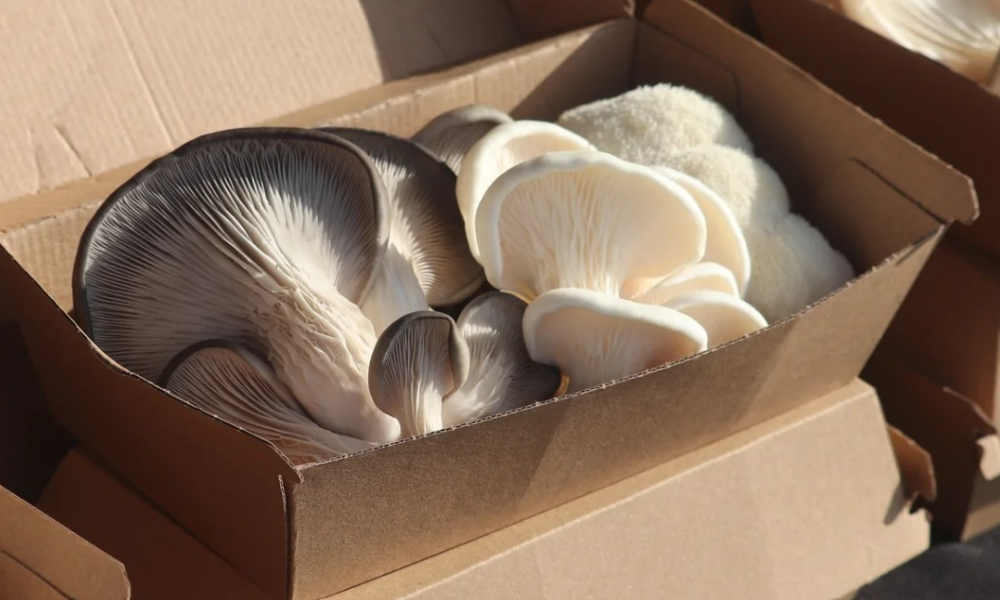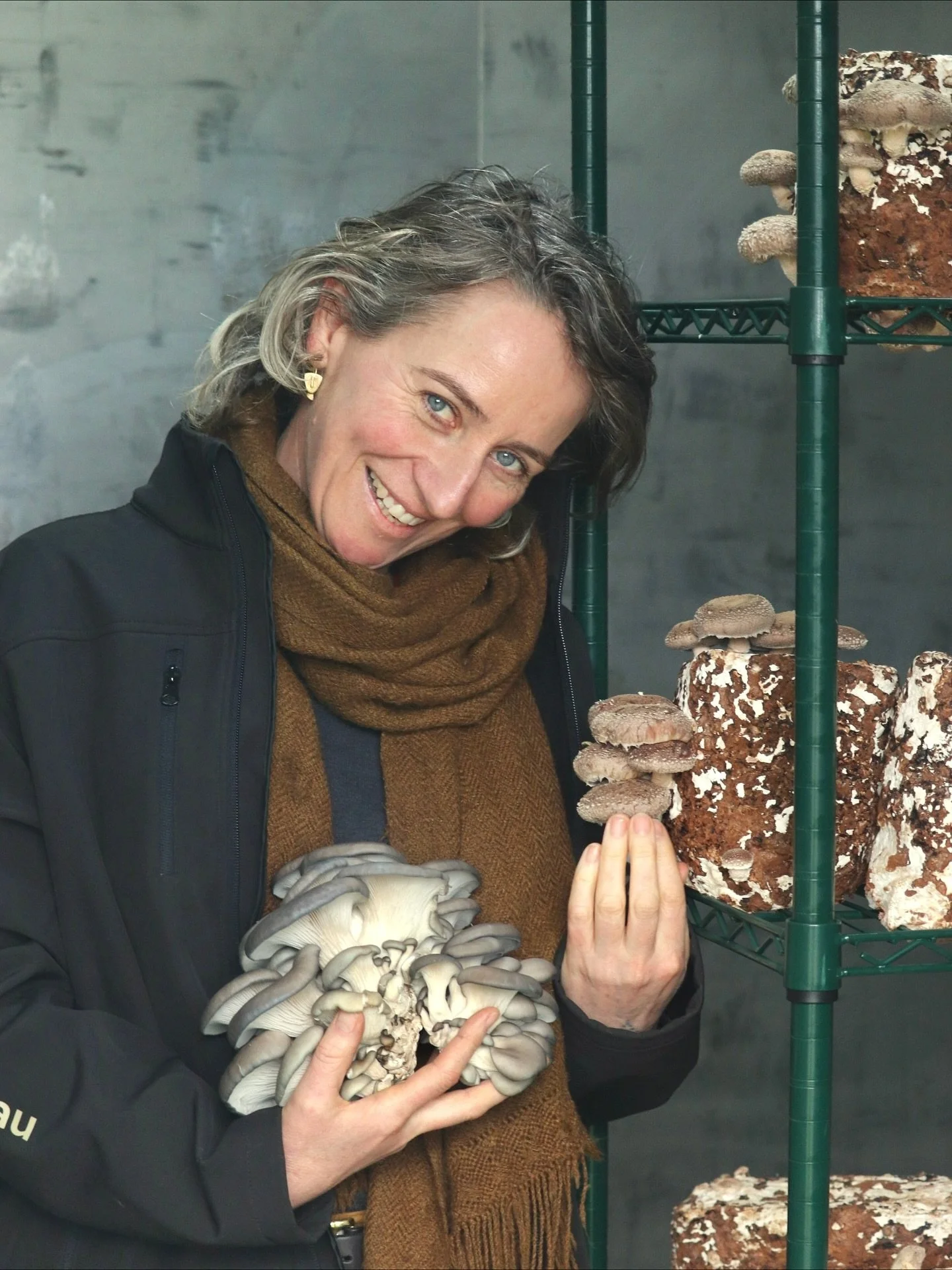Sporadical City Mushrooms: Small space, deep roots
In a quiet pocket of Alphington, Victoria, Sporadical City Mushrooms is cultivating something special. What began as a homegrown experiment in a Carlton carport has evolved into a thriving urban farm built on creativity, collaboration, and a deep respect for good food. It’s a business that blends innovation with heart, proving that even in the city, farming can flourish.
“We grow gourmet mushrooms,” says Julia Laidlaw, founder and chief mushroom grower. “We've got three varieties. We do seasonal oyster mushrooms, and then in the last couple of years we've also branched out into growing lion's mane mushrooms and shiitake as well.” The farm occasionally experiments with other species, but oyster mushrooms remain the backbone of the business - delicate, fast-growing and endlessly versatile.
Sporadical began in the most unlikely of places: a Carlton carport. “I was growing 12 to 20 kilos a week in this tiny little Bunnings tent,” Julia recalls. “I built my own humidifier…dragged an old refrigerator off the street and tucked it in the corner of the carport and turned it on its side and drilled a hole in it to make a hot water pasteurisation unit.” Using wheat straw and buckets, they grew enough mushrooms to sell to local restaurants who snapped them up as fast as they appeared.
When the pandemic hit, the business had to pivot quickly. “We were just selling wholesale fresh mushrooms to restaurants,” Julia says. “And then with COVID and the lockdown, we were constantly getting a lot of leftovers because the restaurants kept on closing. It was a hard time for our little business to make ends meet and I'd ended up just crying to the chefs we sold to, ‘What am I going to do with all these mushrooms?’.”
Then one particular chef said, ‘Well, I can make something with it.’ And so sparked the idea that would change everything. Together they created the O-M-X-O Sauce, a rich oyster mushroom XO. More collaborations followed: O-M-G confit, a cold-smoked mushroom broth, and Funghi Sott’olio, an Italian-style pickle of lion’s mane and shiitake in spiced brine.
Each product tells a story of creativity and community. “A chef, an Italian chef who’s been in Melbourne for a little while, helped develop that one,” they explain. “He initially came to volunteer, but ended up in the kitchen with me.” What began as a necessity - saving surplus mushrooms - evolved into a thriving line of small-batch condiments now found at Melbourne farmers’ markets and specialty grocers.
Image: Julia Laidlaw, Sporadical City Mushrooms
The move to Alphington in 2019 marked a new chapter. “I invited another small scale grower to set up alongside us so we’re actually two mushroom farms here, two completely separate businesses, but there’s a co-working space in the middle,” Julia explains. “We’ve both got shipping containers that we grow in.”
Now Sporadical City Mushrooms produces up to 100 kilos of mushrooms a week in their single shipping container, using hardwood sawdust in recyclable plastic grow bags. “Our business is shaped by a strong zero-waste ethic and I never wanted to use plastic bags in my farming system. I hated the idea of using plastic bags,” Julia admits. “Our whole farm is literally built using recovered or recycled materials - from our used shipping containers to our humidifier made out of a wheelie bin and the concrete slab that is made up of leftover concrete that would have otherwise gone to landfill."
But then came the floods of late 2022 - a turning point that nearly brought the business to its knees. The wheat straw they’d been using turned out to be contaminated with trichoderma, a persistent green mould that quietly infiltrated the substrate. “We just got hammered for six months,” Julia recalls. “We went from losing 10 per cent to losing 80 per cent of our weekly crops. I knew something had to change or I’d be closing down my business.”
Fortunately, the restaurants they supplied were understanding and flexible, giving them space to regroup. The switch to plastic grow bags, which are cleaned at the farm and sent to one of the few facilities in Australia that recycles them into 100% reusable material, “unlocked a lot of time and efficiencies and our ability to scale more broadly.” Reflecting on the experience, Julia adds: “Sometimes crises happen, but you learn from them and then hopefully come out a bit stronger.”
Adaptation and innovation are part of the DNA here. And it’s these qualities that have prompted a bit of a change for Sporadical City Mushrooms. “We stopped selling to restaurants this year because we’re focussing on brand development and pushing our products out into a broader market,” Julia says. “We're just finalising our new labels right now, getting the tick from the food tech, just on shelf life and stuff like that. So when we get all of that signed off, we’ll be reaching out to IGAs.
“I think that'll be a long-term proposition, it might be a year until we get into there, but we've spoken to a few little stores and people are definitely keen to give them a go, but it's a whole process.”
Still, the work remains rooted in the joy of growing. “As the mushrooms start to fruit, it’s just a miraculous process. I really love that, I am constantly learning.”
Since its beginnings in 2018, Sporadical City Mushrooms has grown from a backyard side project into a quietly influential part of Melbourne’s urban farming scene. The farm embodies a belief that good food and strong communities go hand in hand, and that small-scale growers have a crucial role to play in shaping the city’s food future.
In the end, Sporadical City Mushrooms is about more than just beautiful harvests and inventive condiments, it’s a reminder of the true value of small-scale, sustainable food production. Growing food on a local, human scale doesn’t just nourish communities; it protects ecosystems, builds resilience, and reconnects people with the effort behind every bite. As Julia reflects, it’s this connection that matters most:
“Eating as local as possible, knowing your farmer and just the amount of energy that goes into growing food…if you've actually tried it, it would distort what we are accustomed to paying for food.
“I understand it might be out of your price range - which is why we also teach community gardeners and individuals our low-tech, low-cost mushroom growing for easy cultivation because, I totally get that, but I'm saying, just think about it. What is the cost really, what are the hidden costs of actually just giving all your money to supermarkets?”
To find out more about Sporadical City Mushrooms, visit https://sporadicalcitymushrooms.com.au/


